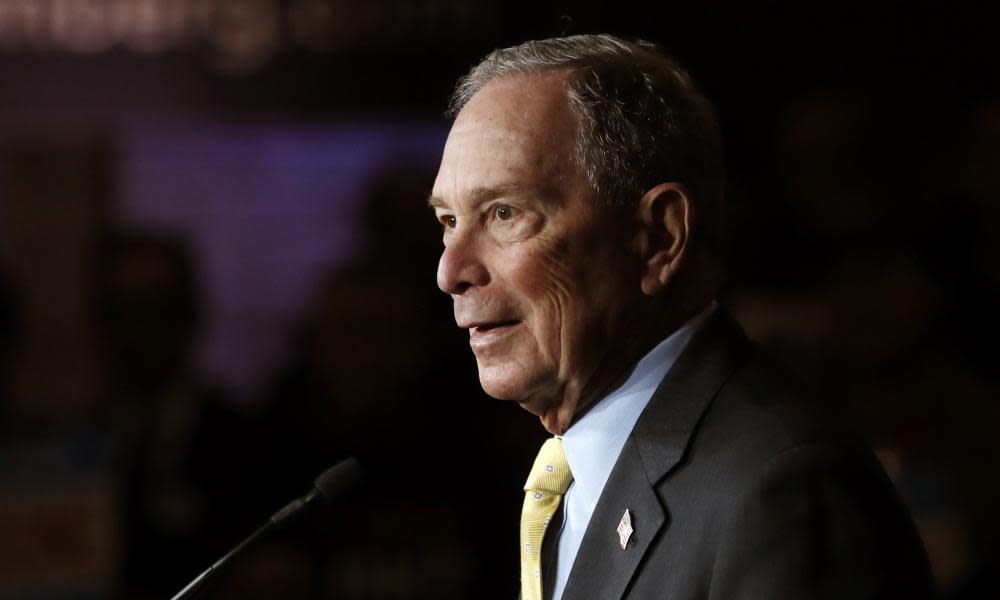Bloomberg condemned over stop-and-frisk comments as Trump feud escalates

Facing criticism after clips of him defending a “stop-and-frisk” policing strategy used while he was mayor of New York circulated online, Michael Bloomberg repeated an apology and insisted: “This issue and my comments about it do not reflect my commitment to criminal justice reform and racial equity.”
Earlier on Tuesday, Donald Trump tweeted then deleted one of the clips, with the comment: “Wow! Bloomberg is Total Racist!”
Related: How New Hampshire could prove the tipping point for Bloomberg
No explanation was given for the deletion. Tension between Bloomberg and Trump, who in 2016 said stop-and-frisk worked “incredibly well”, has increased as Bloomberg has risen in the polls.
Trump later on Tuesday revisited the issue, retweeting a use of a hashtag on the subject, with accompanying abuse about Bloomberg’s physical size and how he plays golf.
In a statement apparently composed before Trump’s second tweet, Bloomberg said the deleted tweet was “the latest example of his endless efforts to divide Americans”. He accused Trump of employing “racist appeals and hateful rhetoric”.
Bloomberg said: “The president’s attack on me clearly reflects his fear over the strength of my campaign. Make no mistake, Mr President, I am not afraid of you and I will not let you bully me or anyone else in America.”
Bloomberg is not competing in early voting states including New Hampshire, which holds its primary on Tuesday. But he has registered as high as 15% in recent national polls. He has also been climbing in polls of African American voters, a key Democratic constituency, as he looks set to become a much more powerful force in the race to pick an opponent for Trump.
In November, shortly before declaring his White House run, Bloomberg apologized for a stop-and-frisk, a policy that disproportionately targeted minorities while he served three terms as New York mayor.
The audio clips that resurfaced this week show him defending the policy in 2013 and 2015. They were posted on Twitter by a podcaster, Benjamin Dixon.
“We put all the cops in minority neighborhoods,” Bloomberg says in a recording made at the Aspen Institute in 2015 which he reportedly blocked from release at the time. “Yes, that’s true. Why do we do it? Because that’s where all the crime is. And the way you get the guns out of the kids’ hands is to throw them up against the wall and frisk them.
“Ninety-five per cent of murders, murderers and murder victims fit one MO. You can just take a description, Xerox it and pass it out to all the cops. They are male, minorities, 16-25. That’s true in New York, that’s true in virtually every city … and that’s where the real crime is. You’ve got to get the guns out of the hands of people that are getting killed.”
Arguing that police should seize guns from minority males in that age bracket, he continued: “These kids think they’re going to get killed anyway because all their friends are getting killed.
“So they just don’t have any long-term focus or anything. It’s a joke to have a gun. It’s a joke to pull a trigger.”
In remarks from 2013, soon after he stepped down as New York mayor, the billionaire told New York radio station WOR an emphasis on arresting minorities was justified.
“They just keep saying it’s a disproportionate percentage of a particular ethnic group,” he said. “That may be, but it’s not a disproportionate percentage of those who witnesses and victims describe as committing the murder. In that case incidentally, I think we disproportionately stop whites too much and minorities too little.”
On Monday, Dixon, the podcaster, said: “Bloomberg’s broken windows policing absolutely created the culture of racial profiling that led to black Americans being disproportionately accosted by the police.”
“Broken windows” policing was instituted by Bloomberg’s predecessor as mayor, Rudy Giuliani, who also embraced stop-and-frisk.
“I inherited the police practice of stop-and-frisk,” Bloomberg said in his Tuesday statement, “and as part of our effort to stop gun violence it was overused.”
In 2013, the practice was ruled unconstitutional.
“By the time I left office,” Bloomberg said, “I cut it back by 95%, but I should’ve done it faster and sooner. I regret that and I have apologized – and I have taken responsibility for taking too long to understand the impact it had on black and Latino communities.”
He also outlined what he said were successes in reducing incarceration rates, overhauling public schools in black and Latino communities and helping “young men of colour stay on track for success”.
Bloomberg’s wealth, reckoned to be about $60bn, dwarves that of Trump and the candidate has been sure to reference the disparity on the campaign trail.
Antipathy between the two men – Bloomberg a Republican turned Democrat, Trump a Democrat turned Republican – is well established and the president is reportedly concerned about Bloomberg’s rise in the polls.
Related: Michael Bloomberg is trying to buy the presidency – that should set off alarms | Robert Reich
A Gallup poll of small business owners released on Monday found that Bloomberg was the only Democratic candidate to beat Trump in a hypothetical match-up: 52% said they favoured Bloomberg while 48% backed Trump. A match-up between former vice-president Joe Biden and Trump was a tie.
As Bloomberg seeks to capitalise on Bernie Sanders’ surge from the left of the Democratic party – hiring staffers and running anti-Trump ads on national TV and radio – the president has hit back with characteristic nicknames and abuse.
Earlier this month, Bloomberg responded to being called “Mini Mike” by saying: “I stand twice as tall as he does on the stage that matters.
“This is what happens when someone like me rises in the polls. I think Donald Trump knows that I can beat him.”
Bloomberg’s press secretary, meanwhile, called the president “a pathological liar who lies about everything: his fake hair, his obesity and his spray-on tan”.

